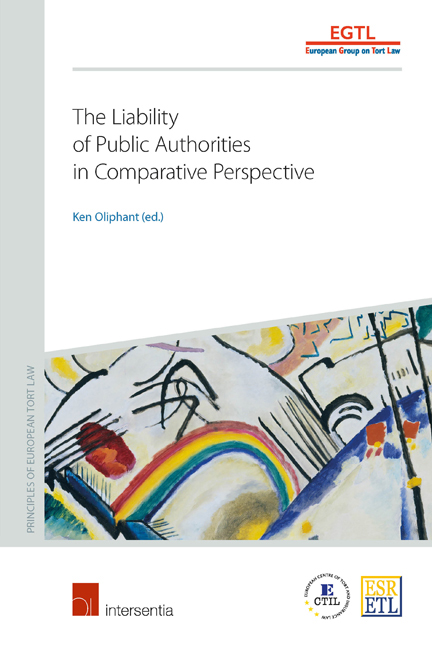Book contents
- Frontmatter
- Preface
- Contents
- List of Authors
- Introduction
- Questionnaire
- PART I PUBLIC AUTHORITY LIABILITY OUTLINED
- Austria
- Belgium
- Czech Republic
- Denmark
- England and Wales
- France
- Germany
- Greece
- Israel
- Italy
- The Netherlands
- Norway
- Poland
- Portugal
- South Africa
- Spain
- Switzerland
- The United States
- European Union
- The Liability of Public Authorities: an Economic Analysis
- PART II CASE STUDIES
- PART III CONCLUSIONS
Italy
from PART I - PUBLIC AUTHORITY LIABILITY OUTLINED
Published online by Cambridge University Press: 27 November 2017
- Frontmatter
- Preface
- Contents
- List of Authors
- Introduction
- Questionnaire
- PART I PUBLIC AUTHORITY LIABILITY OUTLINED
- Austria
- Belgium
- Czech Republic
- Denmark
- England and Wales
- France
- Germany
- Greece
- Israel
- Italy
- The Netherlands
- Norway
- Poland
- Portugal
- South Africa
- Spain
- Switzerland
- The United States
- European Union
- The Liability of Public Authorities: an Economic Analysis
- PART II CASE STUDIES
- PART III CONCLUSIONS
Summary
INTRODUCTION
OVERVIEW
The application of private law rules against the State or, in more precise terms, public administrations, is historically an issue widely debated in Italian law.
This topic can be read along the lines of two dichotomies, that is between civil law and administrative law, on the one hand, and between the jurisdiction of ordinary courts and the jurisdiction of administrative courts, on the other.
With reference to the former, at the end of the nineteenth century, the legal literature was divided between the thesis concerning the applicability of the rules of private law to public administrations and the opposite reconstruction according to which the logic of private law was not suited to solve the problems of administrative activities, including those arising from participation in an illegal activity by a public administration.
The application of ius priva torum sprang from the idea, prevalent at that time, of the supremacy of the civil code. On the other hand, it was precisely the wider range of legal relations of public administrations that induced the idea of dismissing the centrality of the Civil Code and of its ability to provide exhaustive answers to the needs of justice originating from society.
With the aim of avoiding the possible creation of spheres of privilege or immunity for various public administrations, the application of the general rules of private law was advanced as a solution. Still to this day however, we have to admit that the issues concerning which rules to apply in such situations has not been fully resolved.
The nature of the general clause of art 2043 of the Civil Code (CC) is generally agreed upon and therefore attempts to establish the liability of the public administration beyond the boundaries of the Civil Code have not been successful. Nevertheless, the fact that the Italian legal system is based on the distinction, unknown in most other legal systems, between diritti soggettivi (‘legal rights’ which are vested rights typically applicable to juridical relations between individuals) and interessi legittimi (‘legitimate interests’, ie the typical legal protection granted to each citizen against the public administration) blocked, until 1999, full protection against the public administration.
- Type
- Chapter
- Information
- The Liability of Public Authorities in Comparative Perspective , pp. 251 - 294Publisher: IntersentiaPrint publication year: 2016

